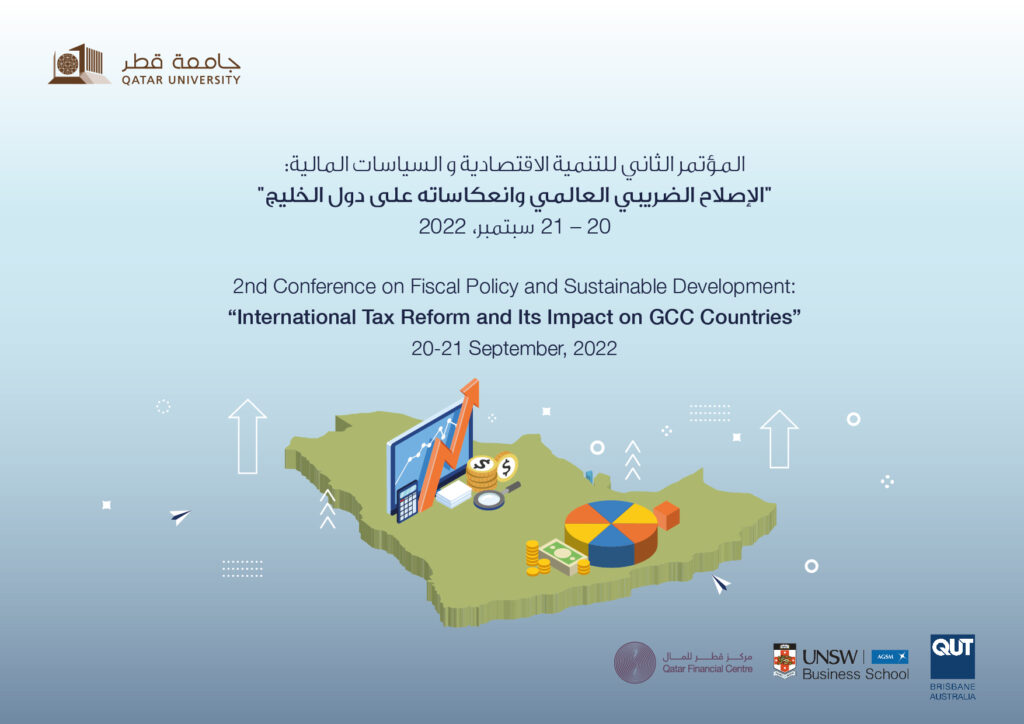
This invitational conference brings together tax experts from around the globe to discuss international tax reform and its impact on Gulf Cooperation Council (GCC) countries. Hosted by the University of Qatar and in collaboration with UNSW and QUT, the conference will consider tax reform in GCC and global minimum tax, the introduction of VAT and tax compliance challenges.
An overview
The Gulf Cooperation Council (GCC) countries are endowed by oil and gas, which makes their economies heavily reliant on them as a main source of government revenue. Further, the oil and gas sector is considered as a key economic player that contributes the bulk of GDP. Thus, the fluctuation of oil and gas prices makes GCC economies vulnerable to economic instability. In order to minimise reliance on the oil and gas sector and to stabilize economies, GCC countries are diversifying their economies away from oil and gas to other sources of government revenue. Economic diversification has been the main strategy of the GCC economic development plans, reflected in developing plans to increase the contribution of the non-hydrocarbon sector, implementing specific programs to spur growth in specific sectors, and the granting specific tax and non-tax incentives to encourage private sector and attracting foreign direct investment. The economic diversification policies focus on specific sectors such as financial sector, manufacturing, tourism and hospitability, and sports through encouraging private investment and FDI. In doing so, GCC countries are endeavoring to encourage FDI through developing friendly business environment and granting various incentives. Tax incentives are the most common type of government incentives, which generally grant tax holidays to FDI investment whether inshore or offshore investment.
The recent development in international taxation led by the OECD with regard to harmful tax competition under Action 5 and the guidelines of global minimum tax under Pillar 2, have raised challenges to the sustainability of granting tax incentives to attract FDI in developing countries in general and GCC countries in particular. This, in turn, increases the pressure on GCC countries to reform their tax policies in order to align with international tax norms and practices.
GCC government initiatives to diversify government revenue has been reflected in a unified Value Added Tax Framework in 2017, which resulted in the introduction of VAT in Saudi Arabia and United Arab Emirates in 2018 and then in Bahrain and Oman. Kuwait and Qatar are planning to introduce VAT in the near future.
This conference aims to achieve the following: (1) discuss the impact of international tax reforms in GCC, (2) propose recommendations on the best practices for tax reform in GCC, and (3) bridge the gap between tax researchers and policy makers in GCC to support tax reform initiatives therein.
Accordingly, the conference will discuss:
- Tax reform in GCC and global minimum tax
- Tax reform in GCC and introduction of VAT
- Tax reform in GCC and tax compliance challenges
Presentations
Impact of the Global Minimum Tax Proposal: A Case Study Approach – Sadiq and Krever Pillar Two Doha
A Diagnostic Tool for Assessing the Corporate Income Tax Compliance Burden: Pilot Study Findings: Sadiq and Brown CIT Burden
Register
لتسجيل الحضور يمكنكم الضغط على الرابط ادناه: https://www.eventbrite.com/e/the-2nd-conference-on-fiscal-policy-and-economic-development-international-tickets-415829967627
For registration and to view the conference program, please visit the following link: https://www.eventbrite.com/e/the-2nd-conference-on-fiscal-policy-and-economic-development-international-tickets-415829967627
Details:
| Start Date: | 20/09/2022 [add to calendar] |
| Start Time: | 8am |
| End Date: | 21/09/2022 |
| End Time: | 5pm |